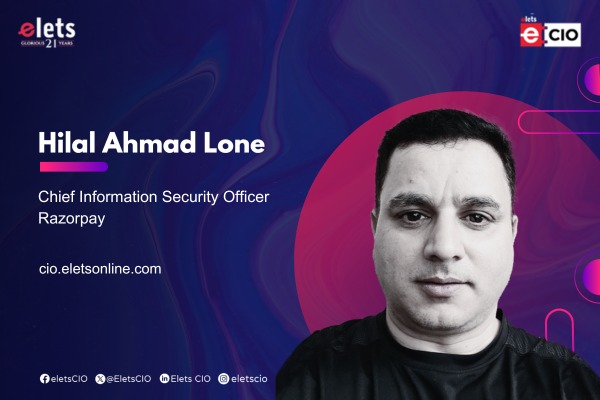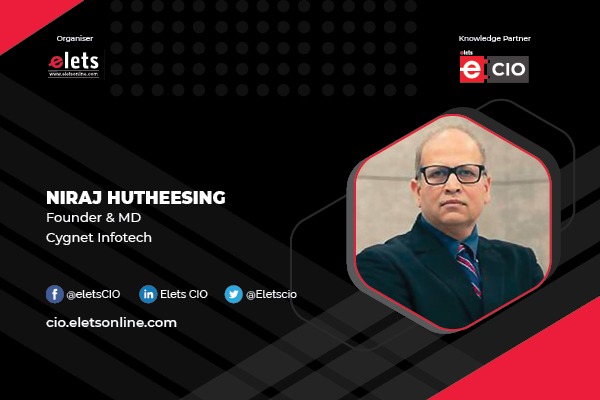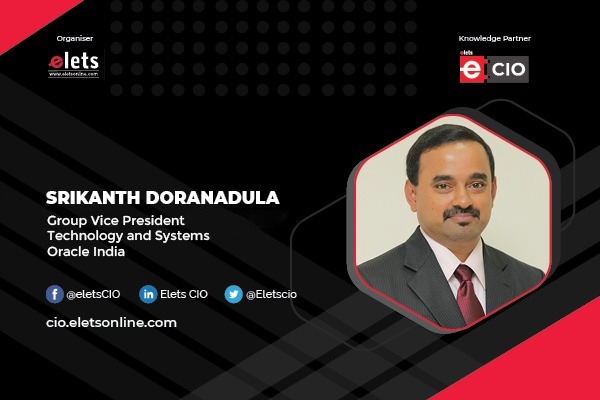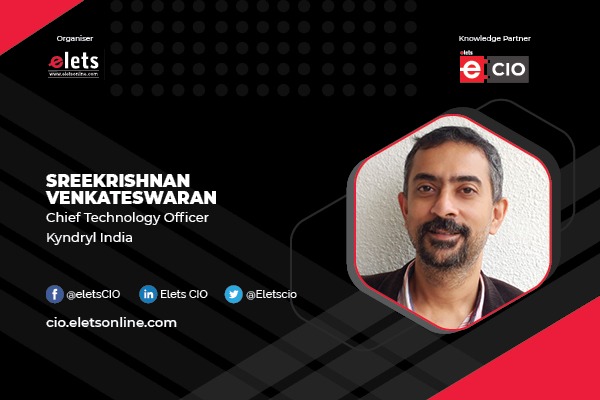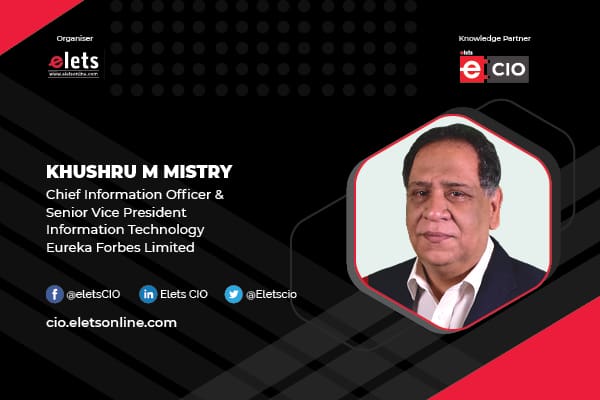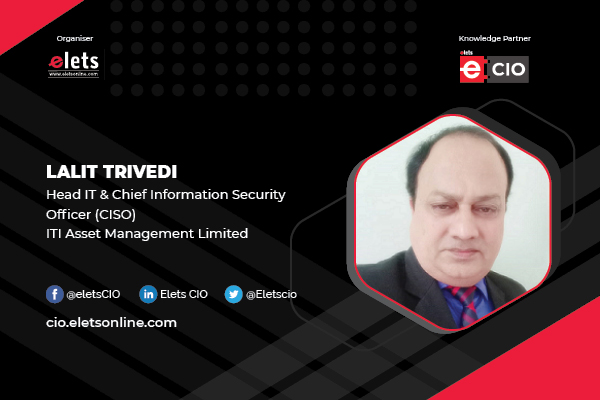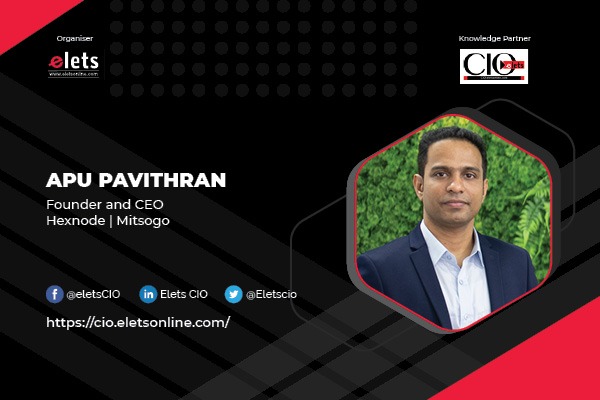
“Bringing personal devices to work, the rapid proliferation of IoT-enabled devices and employees working from unsafe home networks and public Wi-Fi has given hackers a myriad of entry points into a corporate network. Despite their size, every business and organization is at risk of a cyber-attack”. To understand the major expectations from security solution providers and how the companies are strategizing to meet these expectations, Nidhi Shail Kujur of Elets News Networks (ENN) interacted with Apu Pavithran, Founder and CEO of Hexnode|Mitsogo.
1. How big is the enterprise security market in India and what has been the growth rate?

Every year, more and more organizations, from enterprises to SMBs, become victims of cyberattacks. As the threat landscape evolves and new vulnerabilities develop, cybersecurity will continue to grow in priority. The cybersecurity services and products business in India had a turnover of $9.85 billion in 2021, according to the Data Security Council of India, and expanded at a CAGR of 40% over the previous two years.
The pandemic and the cyber risks it brought were vital catalysts for such a rise in cybersecurity spending. As most employees worked from home, CISOs had to deploy new and inspired solutions to secure their corporate resources. In the new normal, a secure and accessible enterprise IT infrastructure ensures business continuity. As a result, enterprise security niches like endpoint management, identity management and cloud security saw significant growth over the past two years.
2. What are the major expectations from security solutions providers? How does your company strategize to meet these expectations?

As a long-time cybersecurity enthusiast, there are two questions I have often heard. The first one is “how does your product help us future proof our security needs.” Future-proofing is great, and it allows your IT admins to be prepared to handle new vulnerabilities or problems that may pop up unexpectantly. In that regard, the immediate future we are looking at is in the cloud. Cloud adoption has been gaining steam for many years. Most modern solutions are being deployed as cloud-based, and legacy solutions are transitioning to a cloud-centric one. Still, it’s not anywhere near done. But chose the cloud way of doing things pretty early in the process. Hexnode is a cloud-native unified endpoint management solution that is able to secure and manage every endpoint in a corporate network.
The second one, I believe, is not just restricted to cybersecurity but is true of most industries. It’s about customer service. Every new solution or architecture has a learning curve attached to it. Customers will need extensive support and assistance, especially since these solutions are responsible for the whole organization’s digital security. Most customers expect the service team to be quick and responsive, which can often be a significant deciding factor in a sales call. If you look at the recent cyberattacks, the importance of choosing the right solution for your business cannot be understated. At Hexnode, we boast a record waiting time of four minutes on average.
3. What are the issues that the CISOs are facing currently?
A CISO has to address many issues, including organizational issues, training employees in cyber-hygiene, hiring and retaining cybersecurity talent, etc. However, I imagine a CISO’s or even an organization’s greatest nightmare is a cyberattack.
Bringing personal devices to work, the rapid proliferation of IoT-enabled devices and employees working from unsafe home networks and public Wi-Fi has given hackers a myriad of entry points into a corporate network. Despite their size, every business and organization is at risk of a cyber-attack. It is the CISOs responsibility to ensure that the organization is prepared and equipped to defend itself against every kind of vulnerability. Furthermore, CISOs must always be equipped with a plan to deal with a breach if one happens. They must be quick to respond and contain the breach so that it doesn’t cause further harm.
Government-issued compliance regulations are another area of concern. Notably, the European Union established the GDPR back in 2016. In addition, in 2019, India introduced its first data privacy bill. These additional regulations should be considered, and CISOs must ensure that the company meets their data privacy and protection standards or risk being penalized.
4. How can cloud security aid enterprises at a time when the threat landscape is continuously changing?
Considering that a significant part of the workforce is still working from home, the current threat landscape is very widespread. Traditionally, corporate networks passed through data centers where security policies were applied. This legacy approach increased latency and was only viable when the workforce was confined to the office. A cloud-centric approach allowed security providers to deploy their products through the public internet as a subscription model. Essentially, this approach makes sure that any user, no matter the location, can utilize corporate deployed security applications. It also means that in the event of provisioning a new device, every security service can be applied out-of-the-box. Additionally, cloud-delivered applications also decrease latency, are more flexible against zero-day threats and can be easily configured.
5. How serious are Indian enterprises when it comes to enterprise security? How much do they invest in the same?
Given the rapid scale of India’s digitization trajectory, it has become a hotspot for cyber-attacks. A recent study by Frost & Sullivan reported that 69% of Indian organizations were at risk of a security breach. However, India’s cyber security business nearly doubled in size after two years of the pandemic. It increased from $5.04 billion in 2019 to $9.85 billion in 2021. As a result, cybersecurity is now one of the most important boardroom priorities and not something restricted to CISOs. Given the enormous increase in expenditures following the pandemic, cybersecurity is the bedrock on which the future of India’s IT business will be built.





